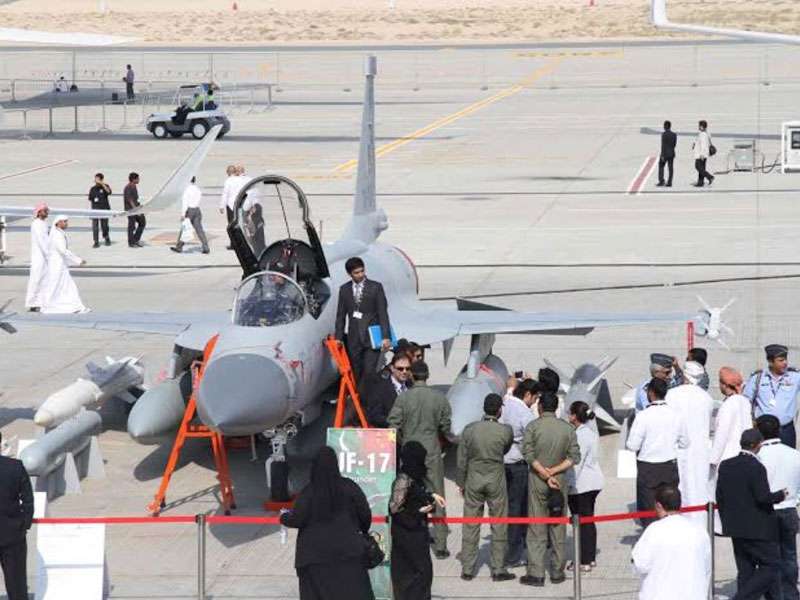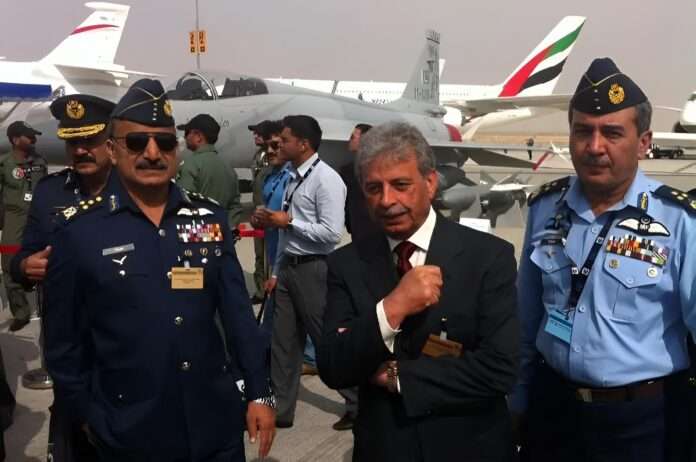The 13th Dubai Air Show was held at Dubai World Central Airport instead of Dubai International Airport this year. It was five day international event where all the international brands and aviation companies participated. More than 200 companies from all over the world displayed their aviation products and aircrafts. A large number of delegations from different countries including Air Chiefs of a number of Air Forces were also present at the occasion. It was attended by 60,000 visitors and 1,000 exhibitors. Sheikh Mohammad bin Rashid Al-Maktoum, Ruler of Dubai and Prime Minister of UAE, inaugurated the Air Show.
Pakistan’s Delegation
Pakistan’s JF-17 Thunder and Super Mushshak had great presence at the Dubai Air Show 2013. Pakistan delegation was headed by Federal Minister for Defence Production Rana Tanveer Hussain, Air Marshal Tahir Rafique Butt and Air Vice Marshal Sohail Gul Khan.
During Dubai Air Show, Federal Minister for Defence Production Rana Tanveer Hussain met several delegates on the sideline of the Dubai Air Show and briefed them about the products and equipments being made within the country by the Defence Industry of Pakistan. Moreover, Minister stressed that the defence equipment produced in Pakistan are low cost but high quality.
Minister also visited the stalls of different International Defence Companies including Rockwell Collins. Claude Alber, Vice President and Managing Director Europe, Middle East and America briefed Minister about the product line of the company and their business activity in Pakistan.
Foreign delegations and visitors appreciated Pakistan’s great stride in aviation technology and the quality of Pakistan defence equipment produced by the Pakistan Defence Industry. They showed keen interest in buying Pakistani products in future.
Pakistan’s Air Chief Engagements
Air Chief Marshal Tahir Rafique Butt, Chief of the Air Staff, Pakistan Air Force, attended the inaugural ceremony of Dubai Air Show 2013. Air Chief Marshal Tahir Rafique also visited various stalls at the show and met with high ranking officials of the air forces of various countries. He also held a meeting with Li Yuhai, Central Executive Vice President of Aviation Industry of China, and discussed matters regarding the performance of JF-17 Thunder. Pakistan Air Force contingent was led by Air Vice Marshal Javaid Ahmed, who is also Chief Project Director for the JF-17 Programme.
JF-17 Thunder
The JF-17 Thunder jointly co-developed by PAF & China Aero-technology Import Export Corporation (CATIC), and co-produced by Pakistan Aeronautical Complex (PAC) and CATIC.
It is a multi-role, light combat aircraft that is equipped with a digital fly-by-wire flight control system that gives it the agility and lethality. It has a complete glass cockpit, excellent man-machine interface and modern self-protection suite, which enhance combat potential and survivability of the aircraft.
It is equipped with fourth generation avionics systems, wide range of conventional & smart weapons, long range glide bombs, Beyond Visual Range & short range Air-to-Air missiles, Anti-Ship missile and Air-to-Surface missiles. The aircraft requires remarkably short lengths of runway for take-off & landing, which offers flexibility of aircraft operations at short air strips.
UAE: Hub of Aviation Industry
Undoubtedly the United Arab Emirates (UAE) is the hub of aviation industry and it has further strengthened its stature after huge success of the recently held Dubai Air Show 2013. It is connecting the world, and the UAE will not be just a transfer point between East and West, but will also be the new economic centre of the world and we will be the economic, touristic and cultural capital for more than two billion people around us,” Shaikh Mohammed said while commenting on the historic $99 billion aircraft orders placed by Emirates airlines at the Dubai Airshow.
Etihad Airways, Emirates Airline and FlyDubai
According to the organizers, between Etihad Airways, Emirates Airline and FlyDubai, more than $150 billion (Dh551bn) of orders were placed with Boeing and Airbus. It would be game changer in the regional aviation industry and moreover, good for the sinking economies of the US and EU. Greater capacity means a wider range of destinations. It is hoped that the higher concentration of airline resources in the UAE will also provide a big boost to support industries, multiplying economic benefits and creating employment opportunities.
Geographical advantage
The orders reflect the geographical advantage enjoyed by the UAE, being sited between the major economies of Asia on one side and Europe and North America on the other. Dubai International Airport is the second busiest in the world by global passenger traffic. Abu Dhabi International Airport is ramping up capacity and was voted this year best airport in the Middle East by an industry group.
GCC Carriers
The Gulf Cooperation Council (GCC) four fast growing carriers showed keen interest while placing new aircraft orders worth $196 billion on the opening day. Outlining the UAE’s unique vision until the year 2021 to become one of the best countries in the world, Shaikh Mohammed said: “We have global economic ambitions in several sectors, including the aviation sector, and the next seven years will be crucial for the UAE to become a major economic player in the world.”
“The President, His Highness Shaikh Khalifa bin Zayed Al Nahyan, is leading a new phase of growth in the country and everyone, in every sector and every emirate, are working together in accordance with unified directives towards a single vision and common goals,” Shaikh Mohammed said.

Dubai Air Show, a successful event
According to the organizers of the show During Dubai Air Show 2013, record-breaking orders were booked reaching to more than the US$200 billion ceiling, raising the event’s profile as a world central business player.
On second day of the air show announcements of more aircraft deals and agreements were announced. These include agreements signed by Mubadala with Boeing and Airbus to further boost existing ties and the $1.26 billion orders for new Airbus aircraft placed by Libyan Wings, a recently launched Tripoli-based airline, as well as billions of dollars worth of engines deals won by CFM International and GE. Bombardier Aerospace and ATR also bagged new aircraft orders.
Moreover, deals for Bombardier aircraft took the order tally to new airshow heights with Iraqi Airways signing a letter of intent for five CS300 mainline jetliners, worth approximately $387 million, increasing to $1.26 billion, if options are converted into firm orders. Even low-cost Thai carrier, Nok Air, placed a firm order for two Bombardier Q400 NextGen aircraft, as well as purchase rights on four more. The order is valued at approximately $63 million and could increase to $258 million if Nok Air exercises its options and purchase rights.
Bell Helicopter announced that by year end it will make the global debut delivery of its first Bell 412EPI to Abu Dhabi Aviation, where it will be used for offshore oilfield support. Saudi Arabia’s Alpha Star Support Services signed a US$13.3 million contract to supply ground support equipment to fellow Saudi Arabian concern TLD. The contract includes two tractors, belt and cargo loaders, air conditioning and ground power units, jet starters and passenger steps.
The show’s order and visitor footprint was living up to the exhibition’s new venue home. The Dubai World Central setting, winning admiration from exhibitors and visitors alike, proved it has international pulling appeal, as business discussions involved potential partners from throughout the GCC, wider Middle East, Africa and Far East.
Multiplier Effects
The airline companies in Dubai and Abu Dhabi have emerged as central to the global aviation industry dynamic. They boost international passenger traffic and build the global aviation business. The world has much more to gain through an enduring positive cooperation with the UAE’s airlines.
Investing in the aviation sector, is a strategic imperative for the region. That the UAE realises this and acts upon it is evident from the record-breaking orders placed, predominantly, by the country’s airlines.
It would be catalysts for the larger economy including building the aviation infrastructure. The aviation sector has indeed played a important role in boosting the prospects of Dubai’s economy. The superb connectivity that Dubai today offers by drawing on its strategic geographic location makes it a business and leisure hub for nearly 2.5 billion people who are now just about four hours flying distance from the city.
Etihad Airways’ orders with US companies are valued at more than $40 billion and translate into a direct impact on America’s gross domestic product and support for major employment throughout the aerospace supply chain. Etihad Airways announced a firm order for up to 56 Boeing wide-body aircraft, with options and purchase rights for a further 26 aircraft, as well as 127 GE Aviation engines, representing an investment of up to $25.2 billion.
In addition to Boeing and GE, Etihad Airways’ investments in the United States also include a $1 billion deal with the travel technology provider, Sabre which recently activated a new IT platform upon which the airline’s entire passenger services system which will operate for the next 10 years. Other Etihad Airways’ partners include Zodiac Aerospace, which has been awarded contracts worth US$ 170 million for aircraft seating, as well as Honeywell US, which has a contract for US$ 40 million to provide avionics equipment.
The success of Dubai aviation industry has multiplier effects on its retail, hospitality and general trade sectors, underlining the success of the city’s economic diversification. From a global perspective, the Dubai Airshow orders have reiterated the status of the Middle East as the fastest-growing aviation and logistics market.
At the airshow the American manufacturer Boeing surfaced as a winner, securing orders and commitments worth US$95 billion and beating its European counterpart Airbus. Combined orders from the world’s two biggest aircraft manufacturers, Boeing and Airbus, reached about $179bn, with most of the buyers coming from the Middle East. France’s Airbus won a total of 160 orders and commitments worth $44bn, as the European manufacturer highlighted the appeal for its flagship jet the A380. Another highlight at the show was Etihad flying its brand with a regional carrier from Europe, after it took a 33.3 per cent stake in Switzerland’s Darwin Airline.
Conclusion
The success of the Dubai Air Show 2013 has multiplier effects. It would boost the retail, hospitality and general trade sectors in the United Arab Emirates. It would generate new employments in the country. It would make air travel more comfortable with the feel at home scenarios in the days to come. It would be game changer in the UAE aviation industry and total placed order of worth $US196 billion would also put it above sky high in the region and of course in the world too.
It is hoped that the new orders would also boost aviation businesses and whole economies in the US and Europe as they translate to creating jobs and supporting ancillary industries in the markets where aircraft majors are based. This is in fact the global significance of the Dubai Airshow.




